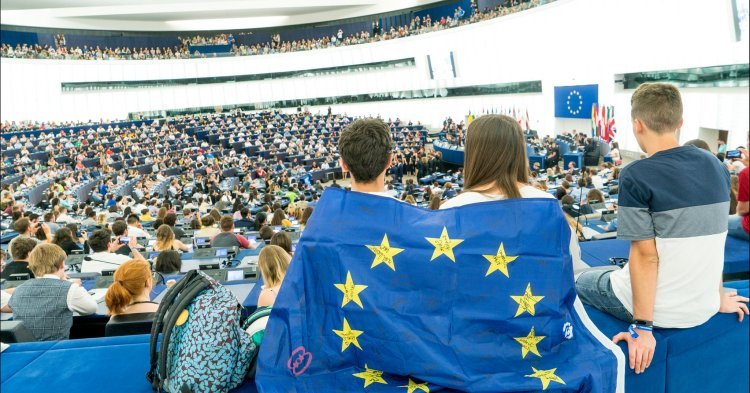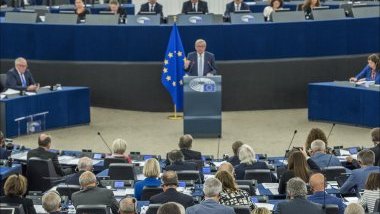Necessity of a European public space of debate
A common political discourse is constituent for any society and democracy. However, on a continental, transnational, multilingual and European scale it has never been easy to create such discourse. Many attempts have been made, including the creation of news channels like Euronews or the Franco-German TV channel ARTE. However, success has been limited. In reality, there are 28 different monologues in the Member States, as German finance minister Olaf Scholz put it in his speech on Europe at the Humboldt University Berlin last November. These monologues sometimes overlap – mostly in times of serious crises, however. [1]
Meanwhile, the necessity of a true European space of debate is now more important than ever. With difficult challenges arising outside and within the European Union, the European project is being put at risk. One could say we are at a crossroads. European citizens have to take a clear decision where they would like the continent to go. But in order to take such a decision collectively and to make sure that Europeans mean the same things, a common discourse on the future of the EU is needed. Such a discourse will not emerge out of the blue. It will rather develop over time. Yet, it has to start at some point. Here are some proposals that might help create a European public sphere.
Europeanise the European elections
Harmonisation of electoral rules
We all know how important European elections are for our common democracy. The elections legitimise our governance system and guarantee freedom and democracy on our continent. However, the fact that in 2014 only 43% of the European electorate voted, compared to 62% in 1979, is worrying.
One reason that might explain this low turnout could be that at the moment there is no real European democracy. There are rather 28 very different national democracies that happen to come together every five years. This becomes evident when one realises that Europeans don’t vote on the same day, that the electoral threshold in the Czech Republic is 5%, in Cyprus 1.8% while in Bulgaria there is none, and that we do not have a uniform age limit for when young people across Europe can stand in the European elections.
All of these differences across Member States make it complicated for normal citizens to understand the EU. How can one expect from citizens to talk about something that they can’t entirely understand? And when something is complicated, people often don’t engage. Which in the end leaves us with a missing common European discourse and leads to a low voter turnout that ultimately threatens the legitimacy of European governance as a whole.
Therefore, one step that could be envisaged is to finally fully harmonise the European election codes. This means: One threshold, one day on which all Europeans vote, one common minimum age for candidates, one way of voting, be it preferential or closed lists. This would not only make the election process more understandable and therefore closer to the citizens but also contribute to the further Europeanisation of our continental democracy. European elections should not depend on national rules anymore.
Transnational lists
Another idea that frankly has re-gained some momentum again, after the election of French president Macron in 2017, is transnational lists. If we were to introduce transnational lists, European citizens would have two votes: one for their respective national parties in their constituency and a second vote for a transnational list created for one pan-European constituency.
As Brexit seemed inevitable and therefore the UK’s 73 EP seats could have been used for something new, the idea of transnational lists came ever closer to becoming reality. However, in January 2018 the European Parliament, most of all representatives from the EPP, ECR, ENF and the GUE/NGL, voted against the introduction of transnational lists.
Yet, what the MEPs of these political groups didn’t seem to realise is that transnational lists would have greatly contributed not only to a stronger European democracy but also to a common European public space of debate. Transnational candidates would have to campaign all across the continent, appearing on different national media formats and directly speaking to citizens from all corners of the EU. This would have led to the crystallisation of truly European public figures and personalities known to a broader European public. It would give Europe a “face” – someone in the debate with whom citizens could relate.
Wherever there are “celebrities” and tangible points for attracting interest, there is also a common space of debate. In addition, European political groups would become more prominent since on election day they would have been on all ballot boxes in the EU as well. Europeans from different Member States could finally have been given the chance to immediately understand the answer when asking each other what parties they prefer or not. A common political discourse on the basis of our elections could have started.
Last but definitely not least, transnational lists would also have an enormous symbolic contribution. Having identical elements on our ballot boxes and one common pan-European constituency would strengthen the feeling of belonging together. It would have shown that the European Parliament is not the representation of multiple national peoples, but much rather the representation of the European citizens as equals.
It is a pity that transnational lists failed, but if envisaged in the future, they will certainly contribute to a common European public sphere of debate.
Cross-border constituencies
One could be even more creative and consider creating cross-border constituencies, leaving the national borders behind. Just like there exist Eurodistricts, there could be Euroconstituencies. Constituencies for example in the region of Strasbourg between France and Germany or at the border of the Czech Republic and Slovakia or even between south Austria and Northern Italy, and so on. Imagine having a bilingual candidate that feels at home in both Member States. A bilingual candidate able to bring populations from both sides of the border together and motivate them to vote for the same person, for the same cause.
This would be something so innovative, so new in the world, that it would inevitably attract media attention from all sides, create European discourse, European identity and foster participation in European elections. It would truly be a major step to a post-border democracy where nationality does not play a role anymore.
Pan-European parties
A similar transnational approach should be applied to political parties. At the moment Europeans still vote on a national basis, with national parties defining the political discourse, even during European elections. After the election, these national parties then regroup in the European Parliament according to their views and ideologies and form “political groups” such as the EPP, S&D, ALDE and so forth.
This, however, leads to a situation in which elected representatives from Hungarian Prime Minister Viktor Orbán’s Fidesz party in Hungary, form a political group, namely the EPP, with elected representatives from Angela Merkel’s German CDU/CSU party. One could strongly doubt that a vote for the Hungarian Fidesz is also meant to be a vote for the CDU/CSU, or the other way around.
With such a political system that is still divided along national borders, it is no wonder that citizens do not exactly understand what their vote could potentially change, how the European Parliament is actually set up and which political forces within the hemisphere represent their interests.
Therefore, one might imagine pan-European political parties. European parties that stand in European elections with one common political program and one common vision. Parties that truly have the same values in each Member State. If created, these truly pan-European parties will Europeanise the political discourse profoundly. Bulgarians, Swedes and Spaniards would be given the opportunity to vote for the same parties, knowing precisely what they are voting for. It would contribute to a common discourse, an easier understanding of European politics and therefore bring the European Parliament closer to its citizens.
In fact, such approaches already exist. Volt, the newly-founded pan-European political movement, tries to rethink the way politics is done on the European level. It runs in European elections all over the continent on the same, identical political program, the so-called Amsterdam declaration.
These approaches might have great potential in forming a European, transnational public space of debate. Only time will tell if political movements like Volt Europa will be successful.
Implementation
Ideas are good, implementation is better.
After hearing some of these ideas at the European Youth Hearings 2018 in the European Parliament, the Hungarian MEP György Schöpflin asked whether I “was planning to impose this”. My answer to this is clearly, no of course not. It is more a question of democratic change. With the European elections coming up in May, one will have to see what the new majorities will look like. And according to Article 223 TFEU, “the European Parliament shall draw up a proposal to lay down the provisions necessary for the election of its members by direct universal suffrage in accordance with a uniform procedure in all Member States [...].”
In other words, the Parliament could at any time change the electoral act, provided it finds the majority. If progressive forces such as ALDE, the Greens, Social and Democrats and new pan-European movements like Volt Europa join forces, there is a real chance for change.
The second part discusses cross-border debate outside election period.



Follow the comments: |
|
